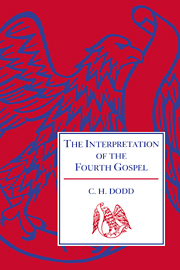Book contents
- Frontmatter
- Contents
- PART I THE BACKGROUND
- 1 The setting in early Christianity
- 2 The higher religion of Hellenism: the Hermetic literature
- 3 Hellenistic Judaism: Philo of Alexandria
- 4 Rabbinic Judaism
- 5 Gnosticism
- 6 Mandaism
- PART II LEADING IDEAS
- PART III ARGUMENT AND STRUCTURE
- APPENDIX: Some considerations upon the historical aspect of the Fourth Gospel
- Index Locorum
- Index Nominum
2 - The higher religion of Hellenism: the Hermetic literature
from PART I - THE BACKGROUND
Published online by Cambridge University Press: 10 December 2009
- Frontmatter
- Contents
- PART I THE BACKGROUND
- 1 The setting in early Christianity
- 2 The higher religion of Hellenism: the Hermetic literature
- 3 Hellenistic Judaism: Philo of Alexandria
- 4 Rabbinic Judaism
- 5 Gnosticism
- 6 Mandaism
- PART II LEADING IDEAS
- PART III ARGUMENT AND STRUCTURE
- APPENDIX: Some considerations upon the historical aspect of the Fourth Gospel
- Index Locorum
- Index Nominum
Summary
Augustine, in a well-known passage of the Confessions (VII. 9), writes:
Thou didst procure for me through a certain person … some books of the Platonists translated from Greek into Latin. There I read—not in so many words, but in substance, supported by many arguments of various kinds—that in the beginning was the Word, and the Word was with God, and the Word was God. The same was in the beginning with God. By him were all things made, and without him was not anything made. That which was made in him was life, and the life was the light of men. And the light shineth in darkness and the darkness comprehended it not. And that the soul of man, though it bear witness of the light, is not itself the light; but the Word of God, being God, is the true light that lighteth every man that cometh into the world. And that he was in the world and the world was made by him, and the world knew him not. But that he came unto his own and his own received him not, but as many as received him to them gave he power to become sons of God, even to them that believe on his name, I did not read there. Again I read there that God the Word was born not of the flesh nor of blood, nor of the will of man, nor of the will of the flesh, but of God. But that the Word was made flesh and dwelt among us I did not read there.
Augustine doubtless speaks for many readers of the Fourth Gospel at an even earlier period.
- Type
- Chapter
- Information
- The Interpretation of the Fourth Gospel , pp. 10 - 53Publisher: Cambridge University PressPrint publication year: 1953

